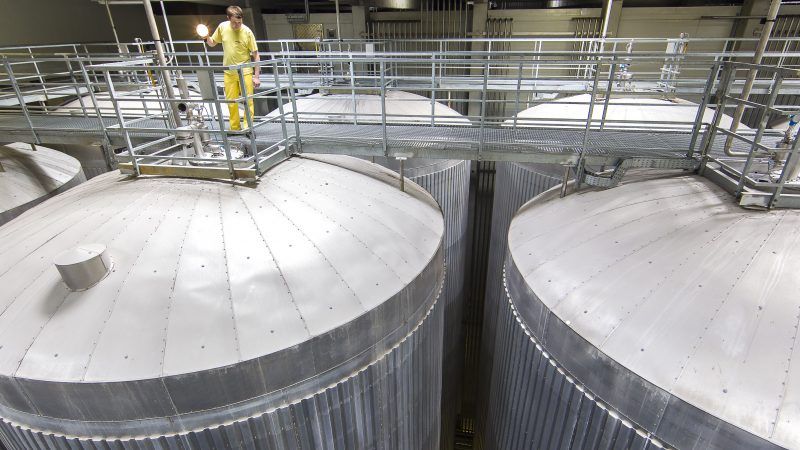Beer Industry Blames Tariffs for 40,000 Job Losses
Who could have predicted this?

Brewers and bartenders are the latest groups of Americans found to be bearing the burden of the Trump administration's trade war.
A new report from The Beer Institute, an industry trade group, blames the 10 percent aluminum tariffs enacted last year for the loss of about 40,000 beer industry jobs. The estimate casts a wide net, including not only beer-making jobs but also those indirectly created through retail and distribution, as well as so-called "induced jobs" that are the result of spending on behalf of beer industry employees and businesses.
According to the report, the beer industry directly employs 70,000 workers, with 437,000 workers in supporting industry jobs, 912,000 workers in retail jobs, along with workers across the economy buoyed by additional spending. In total, the beer industry generates roughly 2.1 million jobs.
The justification for import taxes is usually that they will protect American jobs from foreign competition. Tariffs on a specific good, like aluminum, might help workers in the industry which produces that good. However, workers in industries that use that good as an input suffer.
"I have heard from brewers large and small from across the country who are seeing their aluminum costs drastically increase, even when they are using American aluminum," Jim McGreevy, president and CEO of The Beer Institute, said in March, when the group released a separate report detailing $250 million in higher costs created by tariffs and tariff-associated price increases.
Tariffs loom large over the beer industry, but the most recent report says slower sales could also play a role in the industry's recent job losses. As Reason reported in March 2018, The Beer Institute estimated that aluminum tariffs would cost the United States 20,300 jobs in the beer industry. If that original projection was accurate, the tariffs account for about half of total job losses.
Either way, the economic slowdown is consistent with other studies showing the economic costs of the tariffs.
Tariffs increase input costs for companies and raise prices for consumers. In June 2018, Tax Foundation, a nonpartisan tax policy think tank, found that Trump's tariffs on steel, aluminum, and some Chinese imports would cost the United States over 45,000 jobs, reducing economic output by $11.8 billion. The Federal Reserve Bank of Atlanta estimated the combination of higher input costs and more uncertainty reduced American capital investment by $35 billion in 2018, and a study from economists at Princeton, Columbia, and the Federal Reserve Bank of New York found that the trade war costs consumers roughly $1.4 billion a month.
For example, when the George W. Bush administration taxed imported steel in 2002, making foreign steel more expensive helped save 175,000 jobs in steel-producing industries in the United States. Yet at the same time, increasing the price of steel cost almost 200,000 jobs in industries that use steel in the production process. Tariffs are generally an expensive way to protect workers: according to economists at the Peterson Institute for International Economics, each job protected by these new tariffs costs U.S. consumers and businesses $900,000.
But there is good news. The Trump administration recently eliminated the steel and aluminum tariffs on metal imports from Canada and Mexico after Republicans in Congress made clear they would not approve the new United States-Mexico-Canada trade deal until those tariffs were lifted. But after a year of paying higher taxes on imported aluminum, it's clear that American breweries—like many other industries—did not emerge as winners from Trump's trade policies.


Show Comments (63)